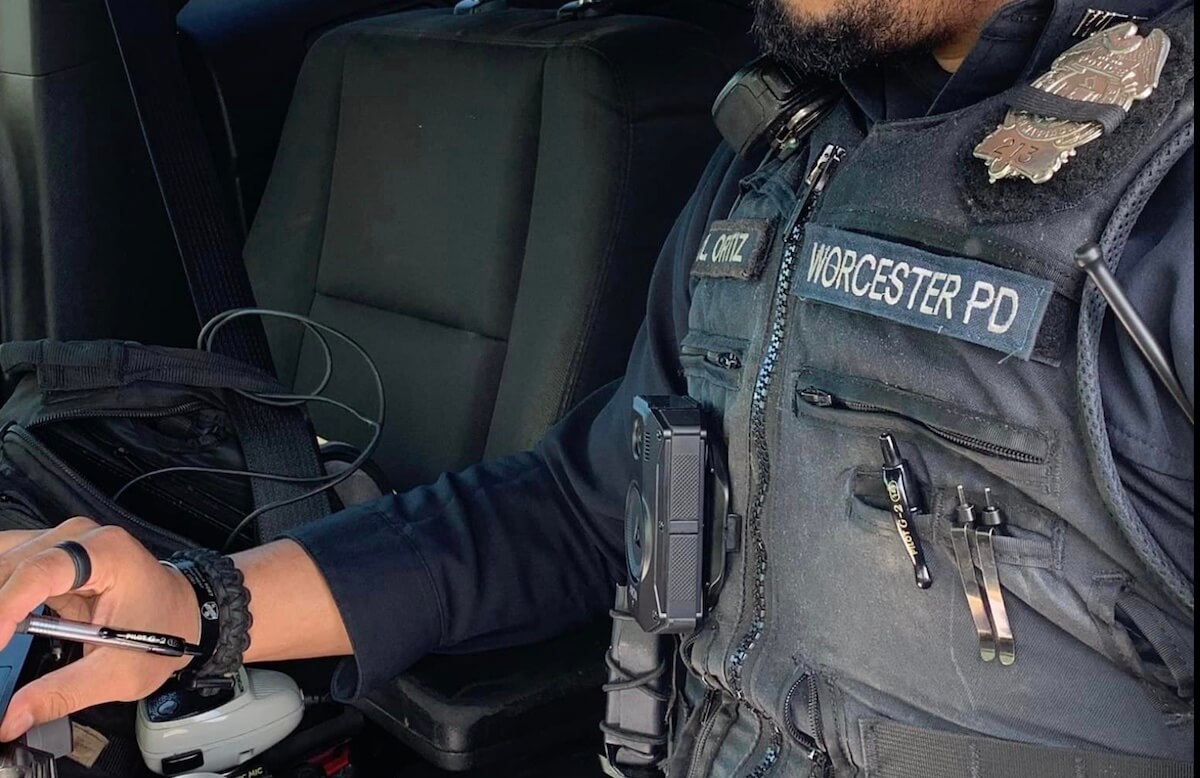After years of research and public debate, the Worcester Police Department now requires officers to use body-worn cameras (BWCs). The WPD’s new policy follows a nationwide trend to increase police accountability by recording officers’ interactions with the public, particularly regarding use of force.
Body worn cameras are meant not only to protect members of the public from police misconduct, but also to protect police officers falsely accused of misconduct. But the use of BWCs raises significant privacy concerns for members of the public whose actions or private homes are captured on video.
Are Body Worn Cameras Always On?
No. Officers are required to manually switch on their cameras when they are dispatched to perform a routine assignment, such as responding to a traffic violation or a crime in progress, but that requirement does not include casual interactions with the public. If a casual interaction leads to more formal police work, however, officers are required to activate their cameras. The BWC also has a built-in failsafe: sudden movement, such as drawing a gun or a taser, activates the camera automatically via Bluetooth.
While much commentary on BWCs has focused on how the technology provides transparency for police interactions with the public, BWCs also raise questions of privacy. Will you always be recorded when you interact with a police officer? Are there any limitations on how the footage can be used?
Massachusetts law prohibits the recording of any conversation without both parties’ consent. Police body cameras do not fall under that restriction, however, because BWCs are visible on the officer’s uniform. Nonetheless, most police departments recommend that officers inform people when they are on camera.
Are There Limits to How BWC Recordings Can Be Used?
What happens when an officer enters a residence while wearing a body camera?
The Massachusetts Supreme Judicial Court addressed this issue in 2021 in the case of Commonwealth v. Yusuf. Responding to a call regarding a domestic disturbance, a Boston police officer wearing a body camera recorded views of the apartment as he moved through it, as well as his interactions with all those present. The footage captured many intimate details, including some potentially illegal items that belonged to one of the residents.
When the officer later downloaded the footage to a department computer, he notified a detective in the youth violence strike force. The detective had been investigating one of the residents for firearms offenses and needed to find a basis for obtaining a search warrant. Researching six months of relevant social media accounts, the detective found a social media post of the suspect holding a firearm near floral-printed curtains. The curtains perfectly matched the curtains shown in the body camera footage. That match enabled police to obtain a search warrant for the suspect’s home, where they found unlicensed firearms and ammunition.
When Does a BWC Recording Constitute an Invasion of Privacy?
Reviewing whether this evidence was admissible, the Court concluded that use of the body camera during the initial scan of the home was permissible because it captured the officer’s observations of items in plain sight. The Court ruled, however, that the investigatory review of the body camera footage, unrelated to the domestic disturbance call, was an unconstitutional invasion of privacy, because the investigation was unrelated to the authorized intrusion into the suspect’s home.
In its decision, the Court wrote that “the home is not a place to which the public has access, or where an individual might expect a recording made during the lawful police visit would be preserved indefinitely, accessed without restriction, and reviewed at will for reasons unrelated to the purposes of the police visit. . . . [A] database of body-worn camera footage of the places where officers are called upon to assist residents, reviewable at will and without a warrant, for unrelated investigations, renders technologically feasible the Orwellian Big Brother.”
In sum, BWCs create the potential for privacy violations if their use is not carefully limited. The Court decision sets an important boundary in Massachusetts.
Image: Worcester Police Department

